- Home
- Robin McKinley
Beauty Page 3
Beauty Read online
Page 3
One of them said to me: “And so this is the horse that wouldn’t eat if you left him behind, eh, missy?” and slapped the horse’s neck jovially. His name was Tom, also, Tom Bradley; and he began to come to our campfire in the evenings sometimes as the days of the journey mellowed into weeks and we all grew more accustomed to one another. Most of the wagoners kept to themselves; they had seen too many travelers in reduced circumstances going to new, unknown homes and destinies to be particularly interested in them. They ignored us, not unkindly but with indifference, as they ignored almost everything but the arrangement of harness and the stacking of loads, the condition of the horses and wagons, the roads, and the weather. Tom Bradley’s visits were very welcome to us, then, because even with Gervain’s ready cheerfulness and optimism we were all inclined to gloom. None of us was accustomed to long, bruising hours either on horseback—which was preferable—or in the wagon, which was built to carry heavy loads, and not sprung or cushioned for tender human freight.
“Eh, now,” Tom would say; “you’re doing none so bad; and it’ll get better in a week or two, as you get used to the way of it. Have a bit of stew, now, you’ll feel good as new.” Tom knew all there was to know about cooking in a single pot over a small fire, and taught us how to bury potatoes in the embers. And when Grace’s saddle sores grew so painful that she could get no sleep at night, he mysteriously found her a sheepskin to sit on, and would take no payment for it. “They call me the nurse-maid,” he said with a grin, “the rest of ’em do; but I don’t mind it. Somebody has to look out for you innocents—if nobody did there’d be trouble soon because you’ve no proper notion how to take care of yourselves. Excepting of course you, sir,” he said with a nod to Ger, who gave a short laugh.
“I’m no less grateful for your help than the others, Tom,” he said. “I know little about wagons, as you’ve found out by now.”
Tom chuckled. “Ah, well, I’ve been twenty—nearer thirty—years at this, and there’s little I don’t know about wagons, or shouldn’t be, for shame. I’ve no family I go home to, you see, so I take to whoever needs me on these journeys. And I’ll say this to you now, as I’ll say it again when you leave us to go your way. I’m wishing you the best of good luck, and I don’t say that often. Nurse-maiding is a mixed blessing, more often than not. But I’ll be sorry to see the last of you folks.”
The journey lasted two long months, and by the time we parted company with the wagoners we were all covered with saddle sores, lame and aching in every inch of bone, muscle, and skin, from sleeping on the ground, and heartily sick of the whole business. The only ones relatively unaffected by what seemed to us girls to be desperate hardship were Gervain and Greatheart; Ger was still as certain and cheerful as he had been ever since he first entered our town parlour over three months ago, and Greatheart still strode amiably along at the tail of the train as if he hadn’t a care in the world. We were all thinner, harder, and shaggier. Tom shook hands all around, and tickled Greatheart under his whiskery chin; wished us good luck as he had promised; and said that he’d see us in about six months. He would be coming to say hello, and to collect the wagon and pair of horses we were taking with us now.
The unaccustomed rigours of travel had deadened us to much looking around at the countryside we passed. Mostly we noticed the ruts in the road, the rocks under our blankets, and the way the leaves on the trees we chose to lie under always dripped dew. As we turned off the main road towards our new home, now only a few miles away, we looked around with the first real interest we had felt for the land we were traveling over.
We were well inland now, far from any sight or smell of the sea; and it was a hilly country, unlike the low-lying and many-rivered area we had left. We parted from our companions of the road at dawn, and in the late afternoon we found ourselves on the main, and only, street of Blue Hill. Children had cried a warning of our approach, and men had looked up, shading their eyes to stare across their small, hilly, carefully cut and tilled fields. We saw young wheat growing, and corn, oats, and barley; there were cattle and sheep and pigs and goats, and a few sturdy, shaggy horses in harness. Most of the men went back to their work; newcomers would keep, but the daylight wouldn’t; but in town there were a dozen or more people collected and waiting to welcome us, and to look us over.
Ger, wizard-like, produced an aunt with six children, who ran the tiny public house; it was she who had heard that he wanted to bring a new bride back to the hills he’d grown up in, and had written him about the empty smithy in her home town. Her smile made us, waifs in the wilderness, feel that perhaps we weren’t utterly lost and forsaken after all. She introduced us to the other people who were standing around, several of whom recognized Ger, or pretended to, as the young lad from over the next hill who’d gone south to the city over ten years ago. Ger’s birthplace and childhood home, Goose Landing, named for the fine winter hunting, and our new home, Blue Hill, had no particular boundaries beyond the little main streets; the farms and fields spread themselves disinterestedly between the Sign of the Dancing Cat, in Goose Landing, and the Red Griffin, Ger’s aunt’s establishment.
Ger’s aunt’s name was Melinda Honeybourne, and she was a widow of four years, having taken over the entire management of the Griffin, which they had owned together, after her husband’s death. She told the two eldest children, who were standing bashfully at the Griffin’s front gate, to look after it and the younger ones, while she climbed into our wagon and came with us “to see our new house.” I picked up the two smallest children and put them in front of me in Greatheart’s saddle.
The house was located beyond the edge of town and isolated from it by the eyeless backs of the village houses, by a few stands of trees left at this far end of town where they were in nobody’s way yet, and by the gentle undulations of the land. Most of the farms lay east of the village in an irregular patchwork of forest and field and stream, on both sides of the main road. Goose Landing lay mostly out of sight beyond the big forested hill to the southwest, with farmlands creeping round its feet and clasping hands at its skirts. The nearest town to the north was Sunnyfield, a three days’ journey, perhaps, through the heavy forest to Blue Hill’s northwest, but no one ever went that way, and it was at least a week’s journey to go around it. Our house’s back was to this great wood that no one passed through.
“Although I’ve no call to say I’ve come to see it, for see it I have many times. Since I could not be certain when you’d finally be coming I’ve been going up once a week, twice when I could manage it, or sending one of the older ones, to open the windows and let some fresh air inside. A closed-up house stales overnight, or nearly, and that’s no proper welcome.” Melinda addressed herself to Grace, who was riding in the wagon. “You’ll find it clean enough to move into, miss, though of course you’ll be wanting to scrub it yourself once you’ve settled. But it’s been boarded up and empty for two years, and the dust was sticky-thick on everything, so Molly—she’s my eldest—and me, we washed everything right well, three months ago, when we heard you were coming for sure. Moving’s a sorry business at best, and it’d make things a bit more comfortable for you. Mind you, though, you’re welcome at the Griffin till you’re fixed up the way you like. I’m used to sudden company for bed and board, and I like it.”
Grace began to thank her for her trouble, but she brushed it away, saying kindly, “And you needn’t worry that you owe us anything, for be sure I’ll take it out of young Ger here when he gets the shop going again. Ah, we’re all delighted to be having our own smith again; it’s a long way from this side of the hill to the Goose forge, you know, and we’re not all of us too pleased with young Henney’s skill besides. You’ve not forgotten the right ways of doing things, there in that city, now, have you, Ger?”
“No indeed: I’m still as clever as the devil himself,” Ger said, and Melinda laughed; but he’d seen Father wince when she, noticing nothing, had spoken with a countrywoman’s scorn of towns.
The two babies I had
collected were named Daphne and Rachel; Daphne was the elder, and would answer direct questions after a long pause spent considering the inquirer’s motives. Rachel said nothing at all, and held on to Greatheart’s mane with both hands. Both of them seemed delighted to be sitting six feet above the ground and not at all frightened, although somewhat annoyed at my desire for conversation.
“There it is,” said Melinda.
The street had faded to a track, which then led vaguely over a small rise in the ground, and there in a shallow dish of a meadow stood a little weather-brown wooden house with a shed beside it, and a smaller shed built out from the larger one. At first sight the house seemed as tiny as a doll’s, delicately carved out of matchsticks, till I realized that this was the effect of the great forest that began only a few hundred feet behind it, with saplings and scrub growing up nearly to its back door. There had once been a fence around a kitchen garden in the back, but it was a jungle of vines and great leafy things gone to seed. A third shed hidden behind the other two we discovered to be a stable, with only two narrow stalls and a leaky roof. There was a well on the small hill we’d come over following the road from the town, but a lovely bright stream jingled its way down from the forest and took a generous bend to be convenient to the forge before it disappeared behind another small hill, heading away from the town.
We had all been dreading this final moment of finding out just what we had come to, and we all took heart at the quiet scene before us. The late-afternoon sun gilded the early-summer green of the meadow, and stained the pink and white daisies to a primrose hue; the buttercups were flame-colored. The house was neat and sturdy and, as we dismounted at its stoop, contrived to look hospitable. Melinda marched in first, as we stood looking around and at one another, and threw open windows, talking to herself as she did so. She poked her head out of a second-storey window and said, “Hi! Come in! It’s none so bad!” and disappeared again.
She was right. It had been well built, and had survived two years of vacancy with little worse than a few drafts around warped window sills, and a front door that had fallen slightly in its frame and stuck when it was fully closed. The house was a long rectangle, the dividing wall cutting the first floor into two rooms roughly square; the kitchen was at the back and the parlour up front, with a fireplace facing into each room from a central chimney. Upstairs was a hall running half the short length of the house to the chimney, with a bedroom on either side; each had its own tiny fireplace. Up a ladder and through a hole you emerged in a doorway in the peak of the roof, one side of the frame being the chimney again; a wall ran away from you in both directions, cutting the attic in two. The roof sloped sharply on two sides, so the attic rooms were almost triangular; Ger, the tallest of us, could stand up straight only while standing one rung down on the loft ladder.
Everything was beautifully clean; there wasn’t a cobweb to be found, and the first two floors were waxed. Melinda grinned at our lavish compliments and said she’d tell them all again to Molly, who had done most of the work, and was young enough still to take pleasure in wild flattery. We laughed and clattered downstairs again, feeling that we had at least one good friend.
Father insisted that we unpack at once, and sleep in our new home. “We thank you, my dear,” he said to Melinda, who blushed, “but we have been sleeping on the ground for so long that mattresses on a planed level floor will be a splendid luxury,” but we agreed to come to the Griffin for supper.
“You’ll save having a lot of people coming here to gawp at you,” she said, “when you’re trying to get your proper work done.” We would also stable our horses there till Father and Ger could repair our own stable. “Your young lady’s pony here,” Melinda remarked, surveying Greatheart, “needs a barn of his own. The little ones will all love him. He’s a giant’s horse, just like in the stories us mothers tell them.” She petted him, refused to be driven back to town, and set off on foot. “I have to add a little more water to the stew,” she said, smiling, “to feed all the extra mouths.” Daphne and Rachel were parted reluctantly from the “young lady’s pony” and trotted away in their mother’s wake.
We were lucky, because everyone in town liked anyone Melinda liked, and everyone was predisposed to like the new blacksmith. Melinda told us that the lack of one had been the chief topic of conversation around the fireplace at the Red Griffin for two years, and if she heard “Ah, what we best need is a proper blacksmith now” once more she would heave a barrel of beer at the speaker.
Ger had the shop going again—bellows mended, the oven for making charcoal patched air-tight, and tools laid out—within a week of our arrival, while the three of us girls were still airing the bedding, mending socks, and figuring out the whimsical nature of the kitchen ovens. Father spent an afternoon in the stable, measuring and whistling and measuring some more, and in three weeks we had our horses under their own roof; and he was building a pen for them, enlarging the hayloft over them, and thinking about a coop for chickens. Melinda had offered us a few pullets.
We three girls didn’t fare quite so well, particularly at the outset; we realized in those first weeks just how spoiled we were, and how unsuited for a life without servants. There’s an art to scrubbing a floor; not a very delicate art, but one that must be learned. I, who was a rougher article to begin with, developed calluses almost at once; my sisters’ tender skin developed blisters, and the coarse material of our new working clothes chafed them. We didn’t talk about our difficulties, beyond the sharing of hints about making things easier that we discovered the hard way; and slowly, as the weeks passed, our darns got less lumpy and our puddings less leaden. We went to bed every night numb with exhaustion, in the beginning, but we grew stronger, and with strength and increasing skillfulness came cheerfulness. Melinda, who almost never stopped talking, had a sharp eye for all of that, and in among her inconsequential chatter she let fall, as if by accident or as among knowing friends, any number of helpful suggestions that we silently though no less appreciatively put to use.
Our first winter was an easy one, the natives told us, and we were as grateful as we could be, although it seemed like a very harsh winter to us. We had never seen more than a few inches of snow on the ground at one time, nor for longer than a few weeks. Greatheart grew a winter coat as thick as a Persian rug, and the long white feathers that grew below his knees entirely covered his huge feet; his short sharp ears were lost in his grey forelock. He was alone in his stable, except for the chickens, since Tom had come through in the autumn, as promised, and collected the two hired horses and the wagon—and complimented us on our progress.
By the time Tom had come and gone I had trained poor Greatheart to go in harness; I was much more conscious of the loss of his dignity than he was, for he had the sweetest of tempers. There wasn’t, as it turned out, very much training to it; Ger traded a mended plough for some second-hand harness that could be patched and enlarged to fit our huge horse; and I put it on him and told him to go forwards and he went. He understood almost by instinct the difference in strength and balance of pulling a weight instead of carrying it. Father built a small wagon for him, and Ger strengthened it with iron fastenings and added some ropes and chains for grappling big logs. The horse developed the white marks that come from wearing a collar in the dark dappled grey hair of his shoulders; but perhaps Tom Black had been right, because he did not seem to miss carrying the King.
Even the canary came through the winter in good health and spirits. He was a very useful bird, because he gave Grace and Hope and me something weaker than ourselves to worry over; and he sang as though he appreciated it.
We had had no time to think of a name for him before we left the city, and it was some weeks even after we’d moved into our new home that Hope, putting water in his dish one morning, looked up suddenly and said, “He still doesn’t have a name!” Grace and I stared back at her, and then at each other, in dismay. We were silent several minutes, Hope’s hand still poised over the water dish; and then the ca
nary, as if impatient, burst into song. We looked at him then, and Grace said, “Of course. Why haven’t we thought of it long since? Orpheus.” I made an incredulous noise and she smiled and said, “A little sister like you, dear, will upset the best-regulated mind”; and Hope laughed and said, “Orpheus! It’s perfect.” And Orpheus he became, except that it degenerated over the months to Phooey. I still called him Orpheus, however, and he still sang.
The following summer, a little over a year after we arrived, Gervain and Hope were married. By that time, another room had been added to the house, opening off the parlour, for the newlyweds’ bedroom; and the local mason built a chimney for it. Father made them a big bed with a tall scallop-edge headboard for a wedding present. Ger and I had had the two attic rooms, and Grace and Hope had shared one of the bedrooms, while Father had the other. Grace invited me downstairs, but I was fond of my attic, and knew besides that she would like having a room of her own again. There had been a small storm about my being shut off in the attic when we first moved in, but I had insisted. Sharing the little room with my sisters, I said, we’d be as crowded as potatoes in a good chowder; someone had to move upstairs, I was the youngest, and besides I liked the attic.

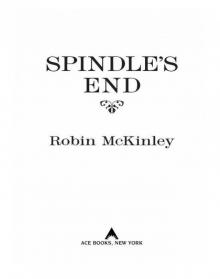 Spindle's End
Spindle's End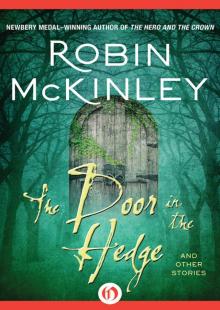 The Door in the Hedge: And Other Stories
The Door in the Hedge: And Other Stories The Blue Sword
The Blue Sword Rose Daughter
Rose Daughter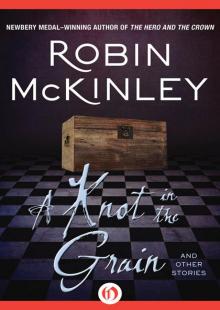 A Knot in the Grain and Other Stories
A Knot in the Grain and Other Stories The Hero And The Crown
The Hero And The Crown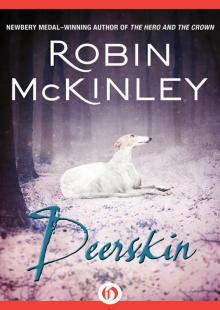 Deerskin
Deerskin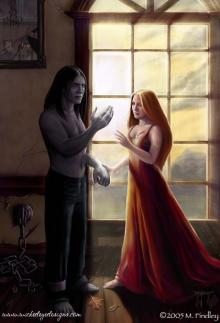 Sunshine
Sunshine Beauty: A Retelling of the Story of Beauty and the Beast
Beauty: A Retelling of the Story of Beauty and the Beast Shadows
Shadows Pegasus
Pegasus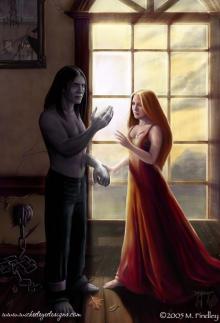 Chalice
Chalice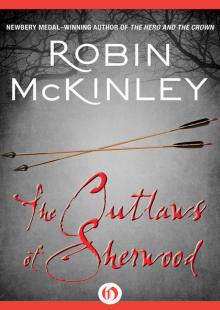 The Outlaws of Sherwood
The Outlaws of Sherwood Fire: Tales of Elemental Spirits
Fire: Tales of Elemental Spirits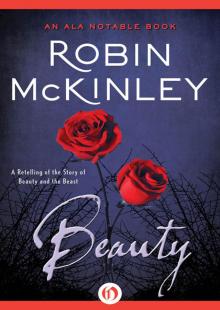 Beauty
Beauty Dragon Haven
Dragon Haven The Hero And The Crown d-2
The Hero And The Crown d-2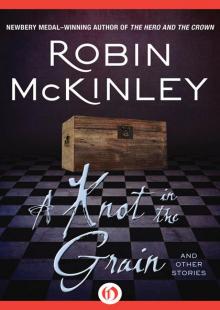 A Knot in the Grain
A Knot in the Grain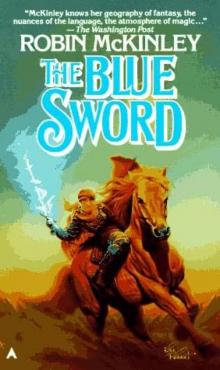 The Blue Sword d-1
The Blue Sword d-1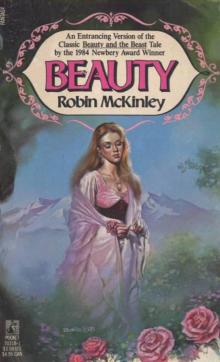 Beauty (v1.2)
Beauty (v1.2)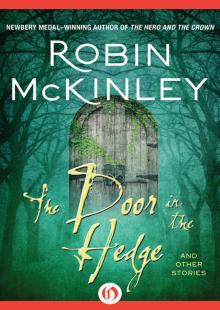 The Door in the Hedge
The Door in the Hedge